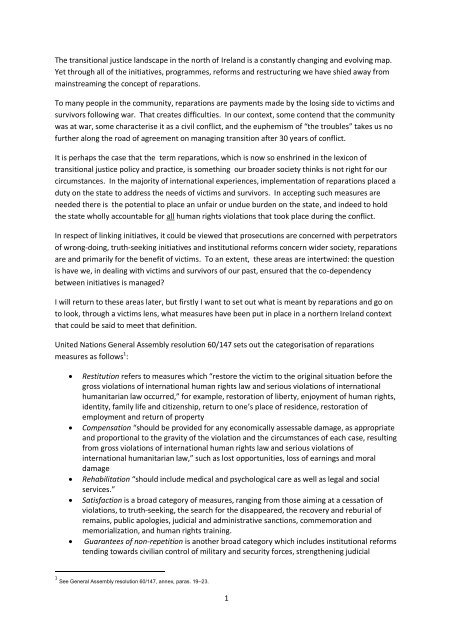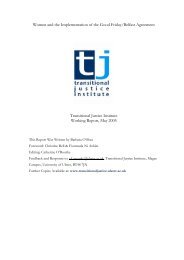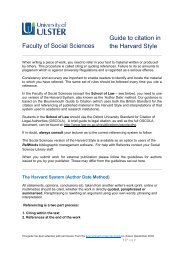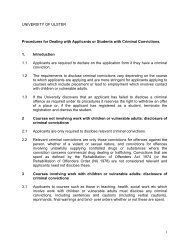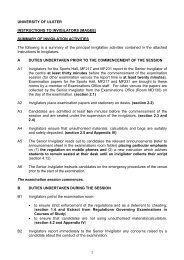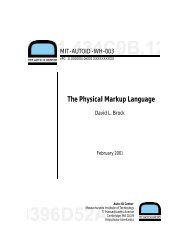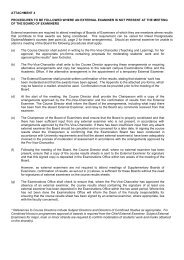Reparations in Northern Ireland – A duty to victims? - Transitional ...
Reparations in Northern Ireland – A duty to victims? - Transitional ...
Reparations in Northern Ireland – A duty to victims? - Transitional ...
You also want an ePaper? Increase the reach of your titles
YUMPU automatically turns print PDFs into web optimized ePapers that Google loves.
The transitional justice landscape <strong>in</strong> the north of <strong>Ireland</strong> is a constantly chang<strong>in</strong>g and evolv<strong>in</strong>g map.<br />
Yet through all of the <strong>in</strong>itiatives, programmes, reforms and restructur<strong>in</strong>g we have shied away from<br />
ma<strong>in</strong>stream<strong>in</strong>g the concept of reparations.<br />
To many people <strong>in</strong> the community, reparations are payments made by the los<strong>in</strong>g side <strong>to</strong> <strong>victims</strong> and<br />
survivors follow<strong>in</strong>g war. That creates difficulties. In our context, some contend that the community<br />
was at war, some characterise it as a civil conflict, and the euphemism of “the troubles” takes us no<br />
further along the road of agreement on manag<strong>in</strong>g transition after 30 years of conflict.<br />
It is perhaps the case that the term reparations, which is now so enshr<strong>in</strong>ed <strong>in</strong> the lexicon of<br />
transitional justice policy and practice, is someth<strong>in</strong>g our broader society th<strong>in</strong>ks is not right for our<br />
circumstances. In the majority of <strong>in</strong>ternational experiences, implementation of reparations placed a<br />
<strong>duty</strong> on the state <strong>to</strong> address the needs of <strong>victims</strong> and survivors. In accept<strong>in</strong>g such measures are<br />
needed there is the potential <strong>to</strong> place an unfair or undue burden on the state, and <strong>in</strong>deed <strong>to</strong> hold<br />
the state wholly accountable for all human rights violations that <strong>to</strong>ok place dur<strong>in</strong>g the conflict.<br />
In respect of l<strong>in</strong>k<strong>in</strong>g <strong>in</strong>itiatives, it could be viewed that prosecutions are concerned with perpetra<strong>to</strong>rs<br />
of wrong-do<strong>in</strong>g, truth-seek<strong>in</strong>g <strong>in</strong>itiatives and <strong>in</strong>stitutional reforms concern wider society, reparations<br />
are and primarily for the benefit of <strong>victims</strong>. To an extent, these areas are <strong>in</strong>tertw<strong>in</strong>ed: the question<br />
is have we, <strong>in</strong> deal<strong>in</strong>g with <strong>victims</strong> and survivors of our past, ensured that the co-dependency<br />
between <strong>in</strong>itiatives is managed?<br />
I will return <strong>to</strong> these areas later, but firstly I want <strong>to</strong> set out what is meant by reparations and go on<br />
<strong>to</strong> look, through a <strong>victims</strong> lens, what measures have been put <strong>in</strong> place <strong>in</strong> a northern <strong>Ireland</strong> context<br />
that could be said <strong>to</strong> meet that def<strong>in</strong>ition.<br />
United Nations General Assembly resolution 60/147 sets out the categorisation of reparations<br />
measures as follows 1 :<br />
Restitution refers <strong>to</strong> measures which “res<strong>to</strong>re the victim <strong>to</strong> the orig<strong>in</strong>al situation before the<br />
gross violations of <strong>in</strong>ternational human rights law and serious violations of <strong>in</strong>ternational<br />
humanitarian law occurred,” for example, res<strong>to</strong>ration of liberty, enjoyment of human rights,<br />
identity, family life and citizenship, return <strong>to</strong> one’s place of residence, res<strong>to</strong>ration of<br />
employment and return of property<br />
Compensation “should be provided for any economically assessable damage, as appropriate<br />
and proportional <strong>to</strong> the gravity of the violation and the circumstances of each case, result<strong>in</strong>g<br />
from gross violations of <strong>in</strong>ternational human rights law and serious violations of<br />
<strong>in</strong>ternational humanitarian law,” such as lost opportunities, loss of earn<strong>in</strong>gs and moral<br />
damage<br />
Rehabilitation “should <strong>in</strong>clude medical and psychological care as well as legal and social<br />
services.”<br />
Satisfaction is a broad category of measures, rang<strong>in</strong>g from those aim<strong>in</strong>g at a cessation of<br />
violations, <strong>to</strong> truth-seek<strong>in</strong>g, the search for the disappeared, the recovery and reburial of<br />
rema<strong>in</strong>s, public apologies, judicial and adm<strong>in</strong>istrative sanctions, commemoration and<br />
memorialization, and human rights tra<strong>in</strong><strong>in</strong>g.<br />
Guarantees of non-repetition is another broad category which <strong>in</strong>cludes <strong>in</strong>stitutional reforms<br />
tend<strong>in</strong>g <strong>to</strong>wards civilian control of military and security forces, strengthen<strong>in</strong>g judicial<br />
1 See General Assembly resolution 60/147, annex, paras. 19<strong>–</strong>23.<br />
1


